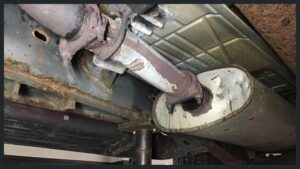
5 Symptoms of an Exhaust Leak (How to Tell)
The exhaust system serves two purposes for your vehicle. First, it converts toxic gases produced during the combustion process into less toxic gases. Second, it releases these gases through the tailpipe, away from the engine and exhaust system.
These gases are carbon emissions and are typically colorless and odorless to the nose and eyes. If your exhaust system is not working properly, these gases can leak and get into the passenger compartment where everyone is seated. These gases are toxic and can be fatal if inhaled in large quantities.
The 5 Most Important Signs of an Exhaust Leak
Of course, you shouldn’t wait until you lose consciousness from carbon monoxide poisoning before addressing an exhaust leak. There are many less serious symptoms to look out for that indicate an exhaust leak.
It’s important not to simply ignore these signs. Consult your local auto repair shop as soon as possible before the exhaust leak poses a serious threat to your health. Here are 5 common symptoms of an exhaust leak in your car:
1) Poor fuel economy
If you have a leak in your exhaust system, your engine control unit can’t get an accurate reading from the O2 sensor about the amount of oxygen flowing in and out through the valve.
Because of this, your engine burns more fuel to compensate. This results in less fuel consumption and higher fuel costs.
Of course, this symptom could also simply be caused by a faulty oxygen sensor. But you won’t know for sure until you take your car to a repair shop and have a professional check to see which sensor is causing the problem.
2) Loud acceleration
When you step on the accelerator to accelerate your vehicle, it is normal to hear a low rumbling sound. This is the sound of the engine spinning its components and creating the power needed to make your vehicle go faster.
However, if you hear a strange noise that you normally don’t hear, you may have an exhaust leak somewhere in the system. You should be able to distinguish between noises coming from the exhaust and noises coming from the engine.
3) Loud engine noise
If your engine sounds louder than normal after you start your car, this could be a sign of an exhaust leak. This leak may be due to damage to the gasket that separates the engine block from the exhaust manifold.
This seal is constantly cooling and heating, so it can crack over time. The engine will become noisier as exhaust gases escape through the seal.
4) Burning Smell
Carbon monoxide is indeed completely colorless and odorless. Please note that the exhaust manifold is responsible for collecting all the gases that come out of the cylinders after the combustion process. However, if there is a leak in this manifold, the smell of burning of these gases will still be present.
5) Vibration
If you feel a vibration under your foot when you step on the accelerator, you may have an exhaust leak. The faster these gases escape, the stronger the vibration will be.
You may feel a vibration through your floorboards or steering wheel. At some point, the vibrations reach a level that can be felt throughout the cabin.

